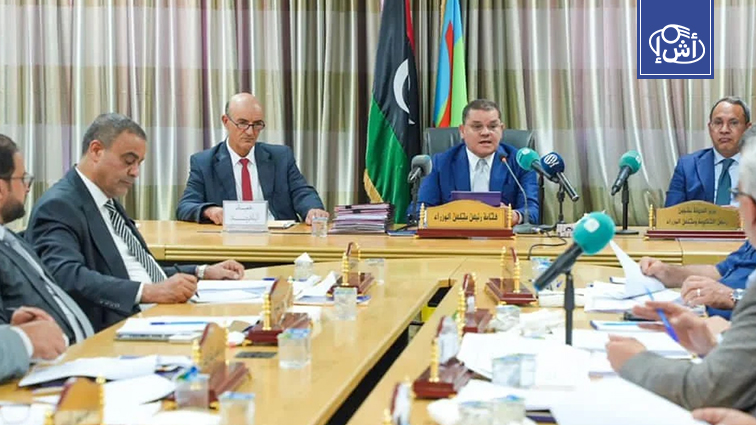The struggle over the position of Libyan Oil Minister constitutes a new episode in the series of divisions affecting the country with the largest crude oil reserves in Africa, which has been going on for about 13 years.
Although the Minister of Oil and Gas in Libya, Mohamed Aoun, announced his return to work about a week ago, the reality indicates that the crisis of division will continue as Khalifa Abdel-Sadiq continues his work within the ministry’s office as a minister-designate, according to what the “Specialized Energy Platform” reported.
The details of the crisis go back to Tuesday, March 26 (2024), when the Administrative Control Authority issued a decision to suspend Libyan Oil Minister Mohamed Aoun from work, due to what it described as “committing legal violations that harmed the public interest of the state.”
Hours after the decision to suspend Aoun, who denied committing any violations, the outgoing Prime Minister of the National Unity Government, Abdul Hamid Dbeibeh, decided to assign the Deputy Minister of Oil and a member of the Board of Directors of the National Oil Corporation, Khalifa Abdul Sadiq, to run the Ministry of Oil.
The “Specialized Energy Platform” quoted informed sources, which it did not name, that after the end of the investigation into Aoun and the lifting of his suspension, it became normal for him to return to the position, but before that, Al-Dbeibeh must cancel the decision to assign Abdel-Sadiq’s successor, which has not happened until this moment.
On May 13, 2024, the Administrative Control Authority announced the lifting of the precautionary suspension on Libyan Oil Minister Mohamed Aoun, after it completed its investigation into him and acquitted him of the violations attributed to him, “the details of which the Authority did not mention.”
Despite the acquittal, Dbeibeh refuses to return Aoun to his duties, as he did not respond to the minister’s correspondence, with whom he tried to communicate in more than one way.
Al-Dbeibeh seeks to end the era of Mohamed Aoun, and is committed to continuing Abdel-Sadiq’s successor in his place, while another source said, “The Prime Minister has been planning for some time to overthrow Minister Aoun, but he was afraid of accusations that he wanted to pass several oil deals that Aoun would reject.”
Between Muhammad Aoun and Khalifa Abdel-Sadiq, work is taking place in the corridors of the Libyan Ministry of Oil and Gas, as both officials carry out their duties from the same building.
Last Tuesday, Libyan Oil Minister Mohamed Aoun broke the period of stalemate that he had been waiting for since the cancellation of the decision to suspend him, announcing his return to carry out his work duties, despite the fact that there was no decision issued by the Prime Minister to cancel the assignment of Khalifa Abdel-Sadiq.
The official page of the Libyan Ministry of Oil, which is controlled by Minister Mohamed Aoun, published a statement in which it referred to the decision of the Administrative Control Authority to lift the precautionary suspension and end the investigation on May 12, 2024, and to notify the government of this, announcing that Mohamed Aoun will assume his duties in the office of the Ministry of Oil and Gas.
Meanwhile, Khalifa Abdel-Sadiq continued his duties as Minister-designate, as he participated as a representative of the “unity” government in the OPEC+ coalition meeting held last Sunday, June 2.
The “Our Government” page of the National Unity Government published details of Libya’s participation, represented by the designated Minister of Oil and Gas, Khalifa Rajab Abdel-Sadiq, via video communication technology, in the 188th meeting of oil ministers of the Organization of Petroleum Exporting Countries (OPEC), which was hosted by the Saudi capital, Riyadh, in addition to participation in the 37th meeting. For the oil ministers of the organization and the ministers of non-member countries within what is known as the OPEC+ alliance.
Abdel-Sadiq stressed Libya’s adherence to its share in the oil market to ensure regular revenues for the public treasury, and its support in return for the cooperation agreement signed between OPEC+ countries, and everything that would enhance efforts to stabilize the oil market.
On the day following the meeting, Monday, June 3, 2024, the Second Deputy Chairman of the Supreme Council of State, Dr. Omar Al-Obaidi, accompanied by a number of heads of the permanent committees and members of the Council, met with the Minister of Oil and Gas, Mohamed Aoun, at the Council’s headquarters.
The Supreme Council blessed Minister Aoun to begin his work in the ministry, and lift the precautionary moratorium issued by the Administrative Control Authority. During the meeting, the Libyan Oil Minister was heard about the progress of work within the ministry, and how to overcome the difficulties it faces in order to preserve the oil sector from corruption and waste of resources, in addition to research ways to advance this vital sector related to the most important sources of income for the Libyan people.
An informed source says that there is “ignorance” by the authorities and officials in dealing with Muhammad Aoun, as no one wants to anger Al-Dbeibeh or ignore the implementation of his instructions.
The source indicated that the only official body that has dealt with Aoun since his return is the Supreme Council of State, as the Second Deputy Chairman of the Council, Dr. Omar Al-Obeidi, met on Monday with Oil Minister Mohamed Aoun.
Stephanie Khoury discussed with “Amazigh Libya” the situation at the Ras Ajdir crossing
